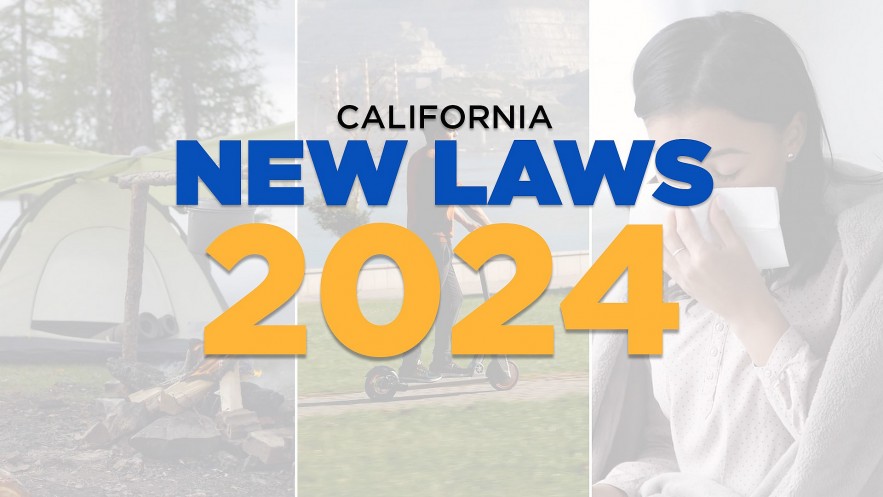Top 9 Most Important New Laws Taking Effect In California 2024
 |
| Most Important New Laws Taking Effect In California 2024 |
| Contents |
In 2023, legislators from California referred hundreds of measures to Governor Gavin Newsom's desk.
The most populous state in the nation will have some significant new laws in 2024 because the governor approved a number of them just before an October deadline for approval or veto.
These 24 new state laws, ranging from public health to employment, will be implemented in California in 2024.
Most Important New Laws Taking Effect In California 2024
1. Mental health legislation
In 2024, courts will keep implementing the Community Assistance, Recovery, and Empowerment (CARE) Act programs in order to provide the most disadvantaged Californians with mental health treatment and support services. The statute permits people with untreated schizophrenia and other psychotic disorders, as well as their family members and first responders, to petition the court for treatment and services. Eight counties—Glenn, Orange, Riverside, San Diego, San Francisco, Stanislaus, Tuolumne, and Los Angeles—put the CARE Act into effect in 2023. By December 1, 2024, the remaining counties in California are required to put the CARE Act into effect (SB 35).
This year, conservatorships have also received attention. Effective January 1, 2025, probate conservators are now required to provide the court with detailed care plans (SB 280). The court will only make these care plans public and confidential if doing so will best assist the conservatee.
In addition, if someone is found not competent to stand trial, has their misdemeanor charges dismissed, is not receiving court-directed services, or is otherwise ineligible for court-directed services, courts must inform them of their need for mental health services and provide contact information for county behavioral health, Medi-Cal, and community-based mental health (SB 717).
READ MORE: Top 13 Craziest and Dumberest Laws in the U.S.
2. Education laws
State Minimum Wage Growth: Beginning on January 1, the state minimum wage will rise to $16 per hour. The minimum wage in California used to be $15.50. The Department of Industrial Relations states that several counties and localities have greater municipal minimum wages.
Healthcare Workers' Minimum Wage Increase: SB 252, sponsored by State Senator Maria Elena Durazo, will increase the minimum wage for healthcare workers to $23. In California, employees must work for accredited healthcare facilities. The first day of operation for this bill is June 1.
READ MORE: The Top 20 Most Absurd Laws in the US That Remain in Effect Today
3. Employment laws
Paid Sick Leave: SB 616, introduced by State Senator Lena Gonzalez, would cover workers who have worked in California for the same company for thirty or more days during the course of their first year of employment. By their 200th calendar day of employment, or at the conclusion of each 12-month period, an employee will be required by the law to have accrued sick leave or paid time off of at least 40 hours or five days. The legislation will become operative on January 1st.
Reproductive Leave: State senator Susan Rubio introduced SB 848, which would require businesses to offer reproductive leave. When an employee requests to take up to five days off after the loss of a family member, it is illegal to deny or accept the request under the California Fair Employment and Housing Act. With the passage of this measure, employees would be permitted to take reproductive leave up to three months after the event, using any remaining leave balance. For more than one reproductive loss in a 12-month period, an employer may refuse to grant leave. The law will become operative on January 1st.
Work from Home: State Senator Angelique Ashby's SB 731 requires employers to give remote employees written notice thirty days in advance before requiring them to return to an in-person setting. If relevant, the notice would also include the worker's right to continue working remotely as a disability accommodation. This measure will become operative on January 1st.
Penalizing Cannabis: Senate Bill 700, introduced by State Senator Steven Bradford, would forbid discrimination by employers against any individual in the hiring, firing, or application process, or in any other aspect of their job.
H-2A Agricultural Workers' Information: AB 635, introduced by Assemblymember Ash Kalra In accordance with Section 2810.5, an employer must, upon request from an employee, provide written notice of the federal H-2A visa in either English or Spanish. It is possible that more languages will be used, in which case the Labor Commissioner will need to develop a template that meets these specifications. The law will become operative on March 15.
4. Traffic and transportation laws
Bicycle Signals: A new section of AB 1909 mandates that cyclists must obey bicycle signals whenever an official traffic control signal or pedestrian control signal with different colored lights or arrows is displayed concurrently with an official traffic control signal or bicycle symbol. This section will take effect on January 1. Speed Cameras: Assemblymember Laura Friedman introduced AB 645, which would permit the establishment of a Speed Safety System Pilot Program by the cities of Long Beach, San Jose, Oakland, Glendale, Los Angeles, and San Francisco. Prior to implementation, the program would mandate that the listed cities conduct a 30-day public information campaign to ascertain the locations of the equipment that would be monitoring infractions. Speed camera violations might result in up to $25 in civil penalties. Up to 2032, the pilot program has authority.
Shared Mobility Devices: AB 410, which Assemblymember Reggie Jones-Sawyer introduced, would broaden the definition of mobility devices to include motorized scooters, electric bicycles, non-electric bicycles, and boards with electrical motors. In order to report improper or unlawful behavior, the proposed rule would mandate that a shared mobility service provider post a tactile sign with raised characters and matching braille, where needed, to identify the equipment. The legislation will become operative on January 1st.
5. Criminal Code
Courts may recall a sentence and resentence a defendant in a criminal process in accordance with AB 600 in order to conform to any new laws. During such resentencing, the district attorney or attorney general would no longer have to agree. In addition, courts would assess postconviction variables and decide if keeping a prisoner behind bars would no longer serve the interests of justice (for instance, if it turns out that the defendant's constitutional rights were violated). If the court determines that the defendant currently presents an unreasonable risk of harm to public safety, resentencing may not take place.
Under AB 791, defendants who have previously been found guilty of a crime carrying a life sentence without the possibility of parole will no longer be eligible for bond releases.
Victims have the right to have a human trafficking advocate and a support person of their choice present during an interrogation by law enforcement in circumstances involving human trafficking or abuse (SB 376).
6. Acquisition and Abandonment of Weapons
If the court orders it under AB 455, defendants engaged in mental health diversion will no longer be permitted to acquire or possess weapons. In addition, firearms may be seized at the site of an incident involving domestic violence or upon the issuance of a protection order against domestic abuse (AB 818). If a defendant is out of detention following a conviction for a relevant offense, they are required by AB 732 to surrender all firearms within 48 hours of the conviction. For the purpose of verifying the surrender of firearms, courts shall have the power to set hearing dates and/or issue search warrants.
A new law under AB 28 will impose taxes on manufacturers, ammunition vendors, and licensed firearm dealers in order to pay for anti-gun violence initiatives. Any additional taxes collected over a certain amount will go toward funding a court-based program for the relinquishment of firearms.
Furthermore, under AB 92, anyone banned from owning a firearm will also be unable to own body armor and will be required to surrender any that they may have.
7. Consumer laws
AB 1084 - Mandates that stores maintain a toy department that is gender-neutral.
Parts, tools, or instructions to repair devices costing more than $50 must be supplied by manufacturers to consumers and repair shops under SB 244, the Right to Repair Act.
SB 478: No more unstated costs. This will force websites to display the full price of a good or service up front starting in July. This covers event tickets, short-term or motel rentals, and food delivery services.
8. Laws Concerning Public Safety
New restrictions on owners and carriers of firearms: Two laws were passed this year by lawmakers and the governor in reaction to the nationwide mass shootings. While AB 28 imposes an 11% fee on firearms and ammunition to assist fund violence prevention initiatives, SB 2 places new restrictions on those who possess concealed carry handgun permits.
SB 14 - Under California law, child sex trafficking is classified as a major felony. As a result, repeat offenders of this crime and other serious offenses may be sentenced to life in prison.
AB 701: Increases prison term for fentanyl traffickers who smuggle more than one kilogram.
The "Ebony Alert" for missing young Black women and children is established by SB 673.
AB 360: This bill forbids "excited delirium" from being accepted as a legitimate cause of death or medical diagnosis. Coroners in other states, notably Minnesota, have classified George Floyd's death using this theory.
AB 452 - Effective January 1, 2022, there is no longer a statute of limitations, or deadline, for victims of childhood sexual assault to pursue damages.
The law known as AB 2282 toughens the penalties for defacing crosses, swastikas, and other hate symbols in public and private places including as cemeteries, businesses, and schools.
9. Housing regulations
Security Deposits: Assemblymember Matt Haney introduced AB 12, which would set the maximum security deposit amount at one month's rent, regardless of whether the unit is furnished or not. Owners of no more than two rental properties, or four units total, will be able to request up to two months' worth of rent under this new regulation. The law will become operative on July 1.
Rent Control: AB 1620, introduced by Assemblyman Zbur, would mandate that rent-controlled unit tenants with mobility impairments be permitted to move to an accessible apartment at the same rental cost and conditions. This requirement will go into effect on January 1st and will be applicable to properties that have five or more rental units.
Credit History: State Senator Susan Eggman introduced SB 267, which forbids the use of a person's credit history in the rental housing application process. Tenants must give the applicant the choice to submit acceptable proof of payment, such as bank statements, pay stubs, and government assistance payments. The law will become operative on January 1st.
Conclusion
Hundreds of new state laws, many of which will safeguard the public and enhance everyone's access to justice in California, went into effect on January 1, 2024. Understanding the law changes will help you avoid violations.
 What are the Differences Between State Laws and Federal Laws in the U.S What are the Differences Between State Laws and Federal Laws in the U.S There are fifty states plus a few territories that make up the United States. Every state has to deal with its own courts and legal ... |
 Top 10 Stupidest Rules Around the World Top 10 Stupidest Rules Around the World There is a lot of surprise and excitement in our world. After reading this list of the ten most absurd rules ever, you'll find your ... |
 Top 10 Most Ridiculous and Crazy Laws in History Top 10 Most Ridiculous and Crazy Laws in History No matter where you live, you're going to run into some laws that defy common sense, even if they're so bizarre that it surprises you. ... |



























